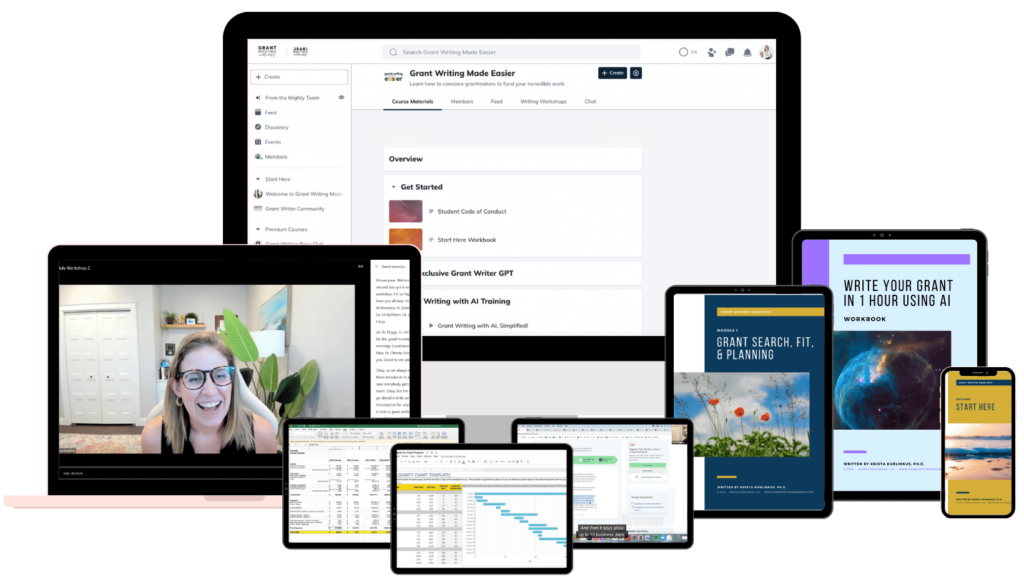Securing funding can often feel like an uphill battle in nonprofits’ fluctuating economic landscape. Tough times call for strategic measures, and mastering the art of grant writing is more crucial than ever. This blog post delves into practical strategies for nonprofits seeking to enhance their grant writing skills and secure necessary funding during challenging periods.
Understanding the Importance of Grant Writing for Securing Funding
Grant writing is an indispensable tool for nonprofits, especially when securing funding during tough economic times. It allows organizations to clearly articulate their missions, outline their projects, and formally request financial support from foundations, government entities, and other donors. In periods of economic uncertainty, the ability to craft compelling and persuasive grant proposals can be critical in determining whether an organization can sustain operations and vital services.
The Crucial Role of Grant Writing in Securing Funding
Effective grant writing involves more than just filling out forms and submitting applications. It’s about telling a story that resonates with potential funders, demonstrating the impact of your work, and making a solid case for why your project deserves their support. With well-written grant proposals, nonprofits can secure funding that supports their mission and enhances their ability to serve their communities.
A robust grant-writing strategy is more important than ever for nonprofit organizations that experience a reduction or increased competition from traditional funding sources. Securing grant funding can provide the stability needed to maintain programs, launch new initiatives, and continue making a positive impact. This involves highlighting the immediate benefits of your projects and showcasing long-term sustainability and alignment with funders’ priorities.
Why Is This Considered a Tough Time for Nonprofit Funding?
The current economic climate poses several challenges for nonprofits seeking funding, making it essential to understand the factors contributing to these difficulties. Here’s a closer look at what makes the current period especially tough for securing nonprofit grants:
- Economic Uncertainty
Global economic instability, fueled by fluctuating markets, political unrest, and unforeseen global events like pandemics, has increased uncertainty. This uncertainty often results in reduced funding as donors and foundations become more cautious with their investments, focusing on preserving capital rather than expanding grant activities.
- Increased Competition
As more organizations feel the pinch of economic pressures, the number of nonprofits vying for the same funding pools has increased. This heightened competition makes it more challenging for individual organizations to stand out and secure grants, as funders have a broader selection of projects and initiatives from which to choose.
- Shifts in Funding Priorities
Donors and grant-making institutions may shift their funding priorities in response to global and local challenges, such as disaster relief, public health issues, or social justice movements. Nonprofits not aligned with these emergent priorities might find it more challenging to attract funding, requiring them to adapt quickly or seek alternative sources of support.
- Budget Cuts and Financial Constraints
Many funding organizations, including government bodies and private foundations, have faced financial constraints and may have reduced the available funding. Budget cuts can lead to smaller grants or fewer funding opportunities, requiring nonprofits to do more with less.
- Increased Scrutiny and Accountability Demands
In tough economic times, donors and foundations scrutinize potential investments more closely. They demand greater accountability and explicit evidence of impact, putting pressure on nonprofits to enhance their measurement and reporting systems. This increased scrutiny requires more detailed and precise grant proposals, putting additional strain on resources.
- Donor Fatigue
With many critical issues demanding attention and funding, even the most dedicated supporters can experience donor fatigue. Nonprofits may find that long-time donors are spread thinner and may not contribute at previous levels, necessitating broader outreach and new engagement strategies.
- Regulatory and Policy Changes
Changes in government policies and regulations can affect funding availability and eligibility criteria. Nonprofits must stay informed and agile, ready to respond to new rules and regulations that could impact their funding streams.
Navigating these challenges requires a robust and strategic approach to grant writing, emphasizing the importance of effective communication, strong project justification, and clear impact demonstrations. In such a competitive and demanding environment, honing your grant writing skills and understanding the nuances of the funding landscape are more crucial than ever.

Strategic Approaches to Grant Writing in Challenging Times
Securing funding during challenging economic periods requires a strategic and nuanced approach. Drawing from decades of experience as a grant writing consultant, here are six key strategies to help you navigate and succeed in these challenging times:
1. Sharpen Your Focus
In tough times, you must hone in on your organization’s core mission and the specific needs you aim to address. Tailor your grant proposals to define how your project will efficiently solve problems or enhance your community. This specificity can increase your appeal to funders looking for impactful investments during economic downturns.
- Action Item: Create a detailed problem statement about your organization’s mission. This statement can serve as a cornerstone for multiple grant proposals, ensuring consistency and clarity.
- Bonus Tip: Use feedback from previous unsuccessful proposals to refine your focus and address potential weaknesses in your project descriptions.
2. Build Strong Relationships with Funders
Long-term relationships with funders can provide a significant advantage. Engage with potential donors well before you submit a grant proposal. Understanding their goals and aligning your projects with their objectives can foster trust and mutual understanding, which is crucial for securing funding when budgets are tight.
- Action Item: Schedule regular check-ins with critical funders to discuss their evolving priorities and how your projects can align with their goals.
- Bonus Tip: Personalize your communications with funders by sharing success stories and updates about your organization’s impact. Personalized communication keeps you on their radar and demonstrates your ongoing value.
3. Highlight Past Successes
Demonstrating a track record of successful project execution and effective use of funds can significantly strengthen your grant proposals. Provide concrete examples of past achievements and explain how they pave the way for future successes. This evidence builds confidence in your organization’s capability to deliver results, even in challenging times.
- Action Item: Develop a portfolio of case studies that highlight your most successful projects, including metrics and testimonials from beneficiaries.
- Bonus Tip: Incorporate visuals such as charts, graphs, and photos to make your success stories more compelling and easily understood.
4. Emphasize Impact Over Processes
Focus your grant writing on the impact of your work rather than just the activities. Funders want to see how their contributions will make a difference. Include quantitative data and narratives that showcase the real-world effects of your work on the community or the issues you address.
- Action Item: Gather and analyze data from your projects to create compelling impact statements. This can include statistics, beneficiary testimonials, and before-and-after scenarios.
- Bonus Tip: Use storytelling techniques to illustrate the human side of your impact, making your proposals more relatable and emotionally engaging.
5. Seek Feedback and Improve
Grant writing is a skill that improves with practice and feedback. After each submission, seek feedback from funders, regardless of the proposal’s success. Use this feedback to refine your approach, adjust your narratives, and better align with funder expectations.
- Action Item: Create a feedback log to track and analyze funder input, using it to improve your proposals continuously.
- Bonus Tip: Join a community of grant writers, such as the one offered through Grant Writing Made Easier, to share drafts, get feedback, and exchange tips. We have a free Grant Writing Community you can join to share ideas and request feedback!
6. Stay Informed About Funding Trends
Stay in tune with the seemingly constant changes within the funding landscape. Economic shifts, new philanthropic priorities, and emerging societal needs can all influence funding availability and donor priorities. Staying informed helps you tailor your proposals to current trends and increases your chances of success.
- Action Item: Subscribe to newsletters and alerts from key funding platforms and organizations to stay updated on the latest trends and opportunities.
- Bonus Tip: Attend webinars and conferences related to nonprofit funding to gain insights directly from experts and network with potential funders.
By implementing these strategic approaches, you can enhance your grant writing efforts and improve your chances of securing funding even during challenging times. Remember, the key is to stay focused, build strong relationships, highlight your successes, emphasize impact, seek continuous improvement, and remain informed about the latest trends in the funding landscape.

Join Grant Writing Made Easier (GWME)
Are you ready to enhance your grant writing skills and secure crucial funding for your nonprofit, especially during challenging times? Join Grant Writing Made Easier today. Our expert-led, AI-optimized course supports nonprofit and grant consulting professionals at all levels, including:
- Novice grant writers who are just starting and need a comprehensive guide.
- Intermediate writers looking to deepen their skills and efficiency.
- Expert grant writers aiming to stand out in a competitive funding environment.
Enroll now and gain access to a wealth of resources, including step-by-step guides, AI tools to streamline your writing process, and a community of professionals who share your commitment to making a difference. GWME supports you through these tough times and beyond, helping you secure the funding your nonprofit needs to thrive.






